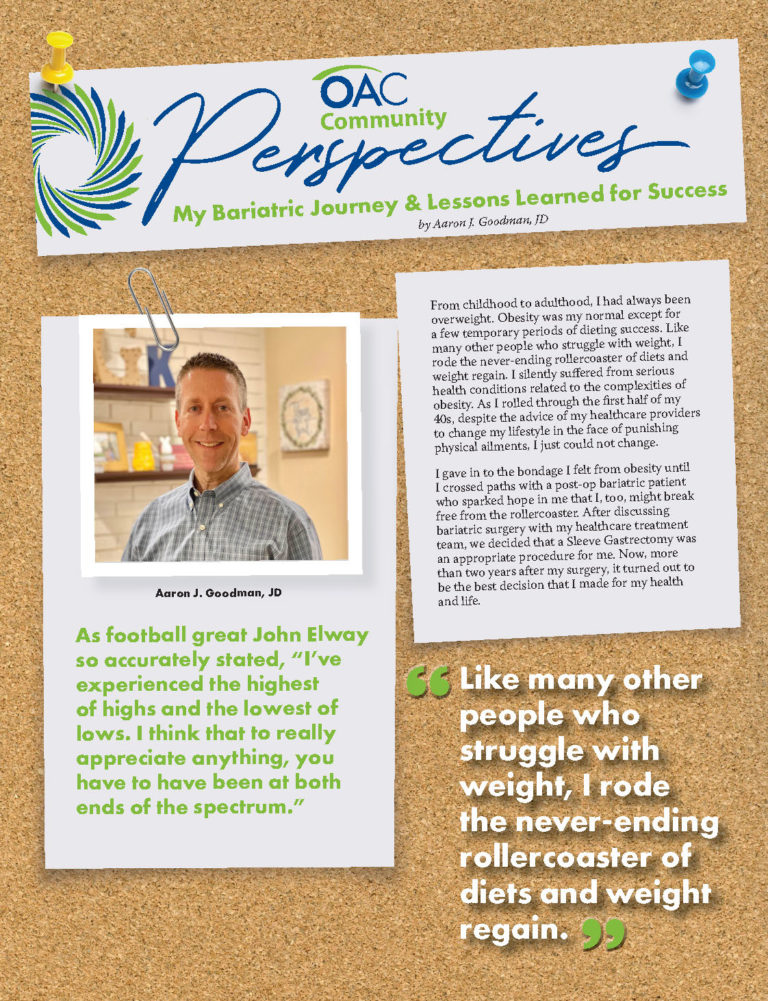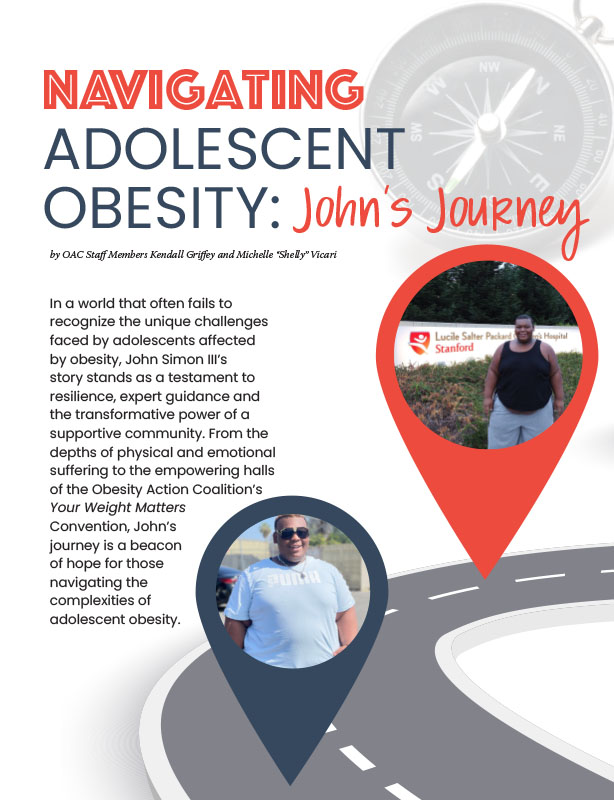OAC Community Perspectives: My Bariatric Journey & Lessons Learned for Success


by Aaron J. Goodman, JD
Fall 2021
From childhood to adulthood, I had always been overweight. Obesity was my normal except for a few temporary periods of dieting success. Like many other people who struggle with weight, I rode the never-ending rollercoaster of diets and weight regain. I silently suffered from serious health conditions related to the complexities of obesity. As I rolled through the first half of my 40s, despite the advice of my healthcare providers to change my lifestyle in the face of punishing physical ailments, I just could not change. I gave in to the bondage I felt from obesity until I crossed paths with a post-op bariatric patient who sparked hope in me that I, too, might break free from the rollercoaster. After discussing bariatric surgery with my healthcare treatment team, we decided that a Sleeve Gastrectomy was an appropriate procedure for me. Now, more than two years after my surgery, it turned out to be the best decision that I made for my health
and life.
Post-op Support Groups and the Pandemic
A few months after surgery, I joined two bariatric post-op support groups at two different medical facilities. I intended to establish good habits and learn from mentors. I knew that support group attendance was (and is) an important tool for long-term post-op success.
By early 2020, the world was changed by COVID-19. As with most everything else, in-person bariatric support groups experienced “hard stops” as the health care industry adjusted to the pandemic. When in-person support groups abruptly ended, post-op bariatric patients were thrown into situations marked by isolation, temptation and anxiety. Many people regained weight due to easy access to food, lack of activity and loneliness. During the spring and summer of 2020, I kept waiting for one (or both) of these local bariatric programs to establish an online support group for post-op patients. It never happened.
Having seen that none of my local bariatric programs had started virtual post-op support groups, I took the initiative to start one myself. In October 2020, I hosted my first patient-led bariatric support group through Zoom. Our topic was “Tips for Surviving the Upcoming Holiday Season” and my keynote speaker was one of the experienced in-person support group leaders. I used a bariatric social media page to promote it. My first support group had several participants and was a success! In November, I hosted another online group and had even more participants, including returning participants.
By this point, news started to spread on Facebook and interest was growing. Given the increased demand but everyone’s different schedules, I began twice-monthly groups in December using the same topic for both meetings. At the time I’m writing this article, I have so far hosted 20 support groups!
Based on the explosive success of my informal group, the director of a local bariatric program reached out to me to learn more about what I was doing. He connected me with his program’s lead psychiatrist who was very enthusiastic about the group. She taught me tips and strategies to become a more effective group leader and I still use them in my group to this day.
One aspect of the online support group that works well is the ease of participant access. The ability to connect from the comfort of home has connected my group to people who otherwise avoid support groups. Additionally, most people are more relaxed at home and willing to open up during sessions. As with traditional in-person support groups, my virtual group empowers participants to share their personal experiences, belong to an encouraging community of others who live the bariatric lifestyle, and learn new tips for long-term success.
Takeaway Wisdom for Bariatric Patients
I want to share some very helpful “tips, tricks, techniques and tools” that we often discuss in my support group. They can help you maximize your chances of long-term success with bariatric surgery.
- Adhere to Your Program’s Food Guidelines and Follow-up Visits
Your healthcare team (surgeon, dietician, psychiatrist, primary care provider, etc.) wants you to succeed, be healthy and have the tools you need to maintain your progress. Strictly follow their guidelines for appropriate nutrition, hydration, vitamins and good habit formation.
- Long-term Success Requires Planning, Preparation and Accountability
Your success depends on forming healthy habits that you will consistently apply. Remember that post-op bariatric life is a permanent lifestyle, not a temporary diet! Self-accountability and tracking your food behaviors are important regardless of whether you use an app or journal. To this day, I weigh and track my food to hold myself accountable.
In group, we often discuss the need to plan ahead. Anticipating situations where eating “off program” may occur, successful patients keep appropriate snacks with them, bring pre-portioned food to work, school and gatherings, and develop routines to prevent finding themselves trapped in tempting circumstances.
- Be Realistic about Your Expectations and Goals
The most fundamental reason for having surgery should be to achieve a healthier life. Try not to compare your body and your results with others because we all arrive at the operating table with different bodies, challenges and starting weights. Do not let the joy of your journey be spoiled because your goal was to reach a specific number on the scale. Instead, focus on the positive changes you’ve achieved since surgery. Take lots of photos to visually document your progress from before surgery through the first two post-op years.
- Celebrate Non-Scale Victories
One of the most uplifting parts about participating in a bariatric support group is exchanging non-scale victories. Whether it is being able to cross your legs for the first time in a decade, flying on an airplane without a seatbelt extender, getting up from the floor after playing with grandkids, having chronic health conditions go into remission, reducing or going off medications, gaining self-confidence or a million other examples, take heart in your own accomplishments unrelated to the number on the scale!
- Learn to Identify Hunger and Fullness Cues
More than anything, hunger and fullness are the greatest challenges facing post-op bariatric patients because our old way of recognizing these feelings has to be relearned. It is important that you learn to distinguish “head hunger” from “stomach hunger.” Head hunger arises impulsively, through anxiety or boredom or emotion, and is anything other than a physical need to eat. Stomach hunger arises gradually and at the appropriate time for your body to receive nutrition. When you feel hungry, learn to determine if it is real hunger or an urge toward emotional eating.
Learning when to stop eating, without overeating, is another challenging post-op skill to master. Before bariatric surgery, many of us ate until we were
loosen-the-belt stuffed. The new normal after surgery is to recognize fullness as a feeling of comfort, not a stuffed feeling. To prevent overeating, focus on learning your body’s cues for when enough is enough and it is time to stop eating. In practical terms, the elementary techniques you first used after surgery such as eating slowly, chewing your food all the way through and not “fork loading” your next bite, will help if you are trying to prevent overeating.
- The Mental Struggle is Real
One of the most common discussion topics in my support group has been dealing with the never-ending mind games and self-sabotaging thoughts we all have. Everything from a negative self-image to feelings of temptation can create an enormous mental burden that is important to acknowledge and control. Work with your bariatric psychiatrist to learn professional tips to help you with these struggles. Emotional peace is a key component of long-term bariatric success!
- Get Active in Bariatric Support Groups
As we each travel on our bariatric journey, it can sometimes feel like we are alone. When you join a bariatric support group, you connect with a community of others who are dealing with many of the same struggles you have. Through your participation, you will not only learn valuable skills, but you will also support others – even when you don’t believe you have anything important to share! In my support group, I give everyone airtime to share their experiences, ask questions and celebrate each other’s progress. My support group thrives because the participants “own” the group through their active communication.
Conclusion
In conclusion, bariatric surgery can be an appropriate tool to manage obesity if you are willing to change your lifestyle and consistently practice healthy habits.
Long-term success after bariatric surgery is not easy, but it is within your reach. If this is a treatment option that you’ve chosen or you are considering, try leaning on a bariatric support group to join you in your health journey. It can not only help you with your personal goals, but also support and uplift others along the way.
Do You Want to Share Your Story?
Whether you have a story about navigating obesity, facing weight stigma or inspiring others, your voice is important. Visit OAC’s story project at WeightoftheWorld.com to share one today. Not sure what to say? Consider one of our question prompts to guide you.
If you would like your story to be featured in a future issue of Weight Matters Magazine, please email membership@obesityaction.org.
by Robyn Pashby, PhD Winter 2024 “No one is ever going to date you if you don’t…
Read Articleby Leslie M. Golden, MD, MPH, ABOM Diplomate Winter 2024 The journey to overcoming obesity is a…
Read Articleby OAC Staff Members Kendall Griffey and Michelle “Shelly” Vicari Winter 2024 In a world that often…
Read Article








